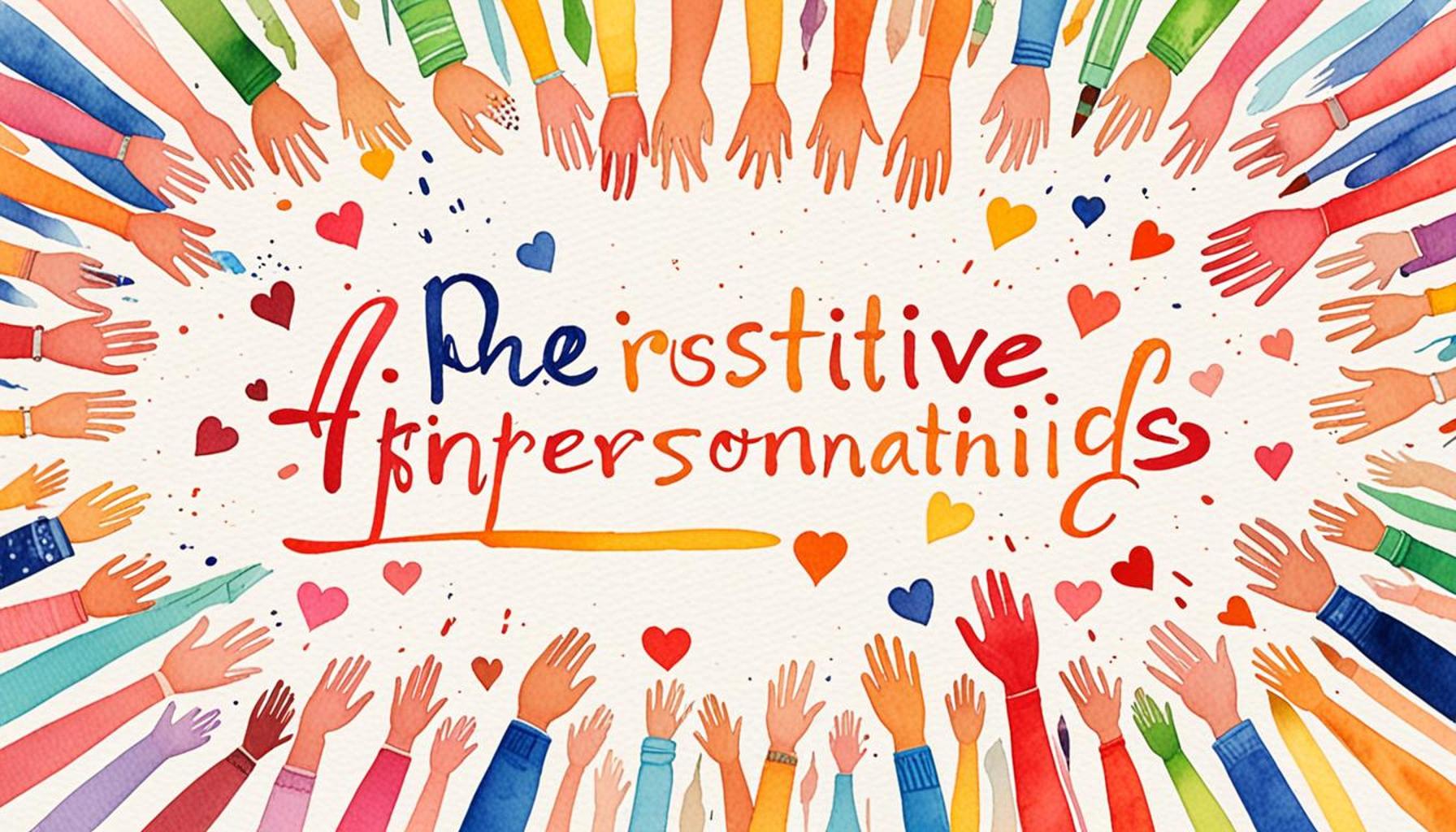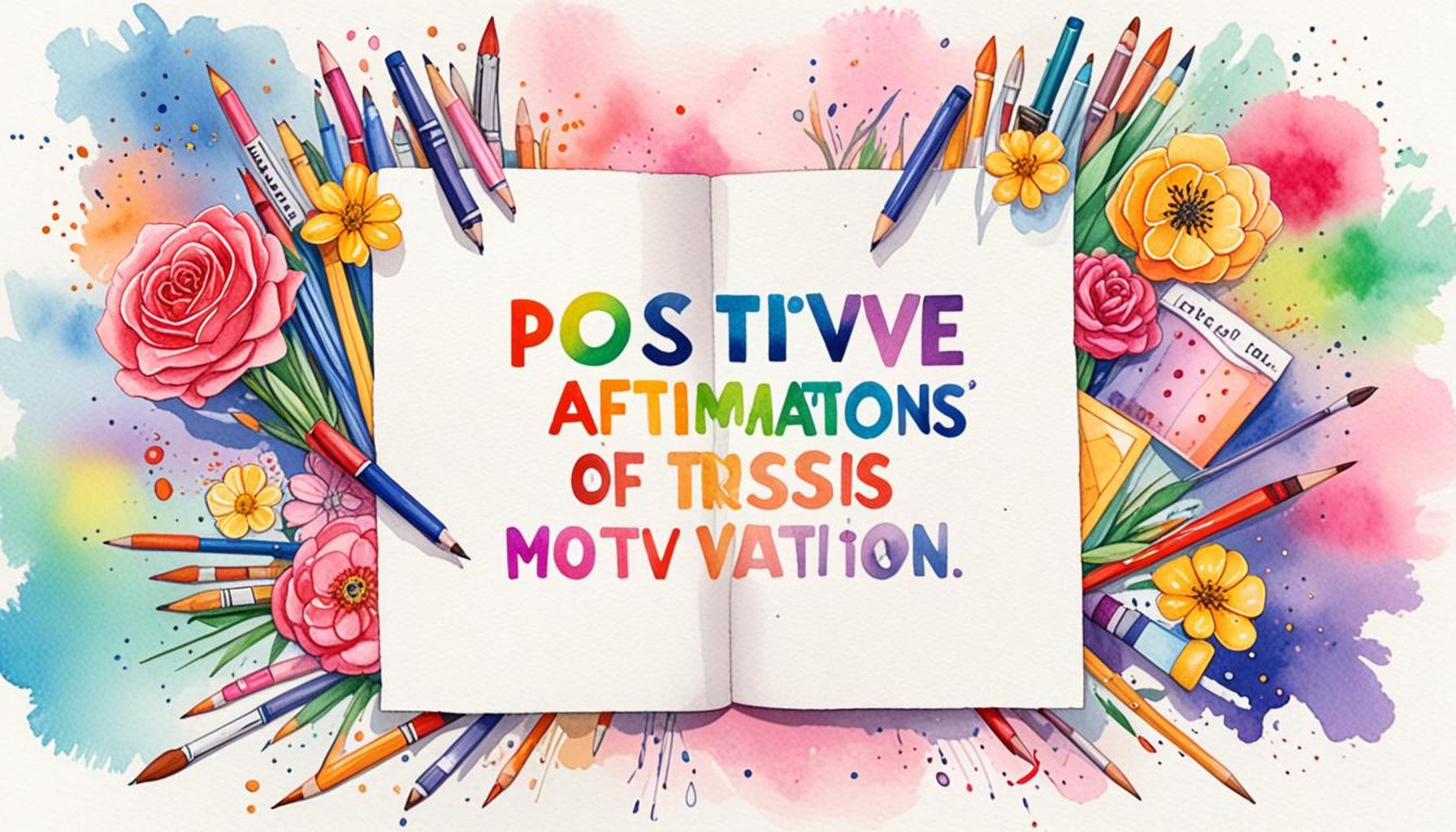The Effect of Positive Affirmations on Interpersonal Relationships: Strengthening Connections and Collaborations

Exploring the Power of Positive Affirmations
In today’s fast-paced society, the quality of our interpersonal relationships can often take a backseat. The power of positive affirmations emerges as a transformative tool to enhance connections and collaborations among individuals. From friends to colleagues, these affirmations can play a pivotal role in shaping our interactions.
Understanding Positive Affirmations
Positive affirmations are simple yet potent statements that can significantly reshape how we perceive ourselves and others. These affirmations can range from “I am worthy of love and respect” to “I contribute value to my team.” The underlying principle is rooted in the belief that our thoughts influence our reality. Here are some key features:
- Boosts self-esteem: Regularly affirming our strengths can lead to greater confidence in our relationships. This is crucial in Nigerian culture, where communal respect and recognition can foster deeper connections.
- Encourages empathy: Positive affirmations promote understanding and compassion towards others. By affirming the positive qualities in our peers, we create an environment of support, which is essential in a multicultural society like Nigeria.
- Enhances communication: Practicing affirmations can reduce conflict and misunderstandings. When we approach conversations with a mindset of positivity, it facilitates open dialogue and constructive feedback.
Research indicates that individuals who practice positive affirmations often report improved relationship quality. This can be particularly relevant in Nigeria’s diverse cultural landscape, where interpersonal dynamics greatly impact community living. For instance, in a community setting, affirming a neighbor’s hard work can encourage others and embellish the spirit of cooperation. Understanding how these affirmations strengthen social bonds could lead to more fulfilling collaborations.
Why It Matters
In a country where unity and communal support are essential, fostering positive relationships can yield many benefits:
- Workplace harmony: Positive affirmations can create a conducive environment for collaboration. In Nigerian workplaces, where team efforts are vital, a culture of affirmation can boost morale and productivity.
- Community cohesion: Affirming words can strengthen the spirit of togetherness. Participating in community events—a hallmark of Nigerian culture—becomes more enriching when individuals affirm each other’s efforts and contributions.
- Emotional resilience: Strong connections help individuals bounce back from challenges. In a society that often faces economic and social hurdles, having a support network fortified by affirmations can be a lifeline.
Exploring these aspects further can unveil new pathways for nurturing interpersonal relationships. As individuals embrace the practice of positive affirmations, it can lead to communities that are not only more harmonious but also more resilient. Engaging in this practice could be the key to transforming relationships, in workplaces, neighborhoods, and beyond, fostering an atmosphere where everyone feels valued and inspired.

ADDITIONAL INSIGHTS: Expand your understanding here
The Impact of Positive Affirmations on Relationship Dynamics
When we delve deeper into the effects of positive affirmations on interpersonal relationships, it becomes evident that these affirmations are not merely superficial phrases; they are transformative statements that can alter the very fabric of how we relate to one another. By fostering a culture of appreciation and acknowledgment within our interactions, we cultivate an environment where connections can truly flourish. This is particularly important in a country like Nigeria, where community and familial ties are the bedrock of society.
Building Trust through Affirmations
One of the core elements of successful relationships is trust. Positive affirmations serve as a catalyst in establishing and nurturing this essential component. When individuals express affirming statements to one another, it creates a sense of safety and validation. For example, acknowledging a colleague’s contributions during a team meeting not only boosts their morale but also reinforces a relational trust that fortifies future collaborations. Such simple acts of recognition can lay the groundwork for effective teamwork that thrives on mutual respect and understanding.
The Role of Positive Language
Moreover, the language we use in our interactions greatly influences the outcomes of our relationships. Research shows that individuals who engage in positive self-talk and affirmations tend to communicate more effectively with others. This can be particularly relevant in Nigerian workplaces or social settings, where communication can often be fraught with misunderstandings. Examples of positive language include phrases like “I believe in your abilities” or “Your ideas are valuable to our project.” When such language permeates discussions, it not only enhances individual self-worth but also promotes a culture of collaboration and support.
The Ripple Effect of Affirmations
The positive effects of affirmations extend beyond individual interactions; they create a ripple effect that can influence entire communities. In Nigerian neighborhoods, for instance, when members affirm one another’s efforts in local initiatives—be it a communal garden or a volunteer project—it strengthens collective bonds and cultivates a spirit of unity. This dynamic is crucial in a multicultural society that thrives on diversity, where respecting and nurturing unique contributions is vital for social harmony.
- Fostering Inclusivity: Positive affirmations encourage inclusivity by validating the experiences and talents of diverse groups, thus ensuring that everyone feels represented.
- Enhancing Conflict Resolution: When disagreements arise, remembering to affirm each other’s worth can facilitate constructive conversations, steering discussions towards resolution rather than escalation.
- Promoting Positive Behavior: Repeated affirmations can lead to a cycle of positivity, where individuals are motivated to affirm others, creating a supportive environment.
By examining these aspects, it’s clear that positive affirmations are not just feel-good statements; they are powerful tools that can significantly shape the dynamics of interpersonal relationships. As individuals and communities in Nigeria embrace this practice, they can unlock new avenues for strengthening their connections, leading to more fruitful collaborations and enriched experiences in their social interactions.
| Advantages | Impact on Relationships |
|---|---|
| Increased Self-Esteem | Promotes positive self-image which enhances interactions. |
| Greater Empathy | Fosters understanding and compassionate responses in conversations. |
The effects of positive affirmations extend beyond individual benefits, significantly shaping interpersonal dynamics. One remarkable advantage of practicing affirmations is the increase in self-esteem. Enhanced self-worth serves as a foundation for rich, meaningful interactions with others. Individuals affirming their strengths are more likely to approach relationships with confidence, enabling them to express themselves openly and authentically, thereby cultivating robust connections.Moreover, positive affirmations contribute to greater empathy within interpersonal relationships. When individuals cultivate a sense of self-acceptance, they are more inclined to understand others’ perspectives. This empathy lays the groundwork for compassionate communication, helping to resolve conflicts more effectively. The ripple effect of these skills creates an environment where collaborations thrive.Studies indicate that the consistent practice of positive affirmations can lead to an overall healthier approach to relationships, encouraging individuals to engage constructively. By embracing this powerful tool, one can unlock the potential to not only boost personal confidence but also strengthen connections with others, nurturing an atmosphere ripe for collaboration and growth.
ADDITIONAL INSIGHTS: Expand your understanding here
The Empowering Influence of Positive Affirmations on Personal Connections
Understanding the transformative power of positive affirmations is essential in recognizing their role in deepening personal bonds. These affirmations do not only boost immediate morale but also contribute to long-term relational growth. When consistently practiced, affirmations can solidify a foundation where individuals feel valued and respected within their relationships, creating a strong sense of belonging.
Enhancing Emotional Intelligence
One crucial aspect of interpersonal relationships is emotional intelligence, defined as the ability to identify, understand, and manage emotions in oneself and others. Positive affirmations can significantly enhance one’s emotional insight, leading to more empathetic interactions. For example, by affirming a friend’s feelings, such as saying “I understand how hard this has been for you,” an individual shows profound support and connection. In a diverse nation like Nigeria, where cultural nuances in emotional expression can vary widely, practicing such affirmations can bridge gaps and promote mutual understanding across different backgrounds.
Encouraging Constructive Feedback
In workplaces where teamwork is critical, the incorporation of positive affirmations can facilitate a culture of constructive feedback. Rather than focusing solely on critiques, colleagues can emphasize strengths alongside areas for improvement. Phrases like “You have a great approach to problem-solving, and I believe you can improve this aspect” help create a balanced environment where feedback is well-received and appreciated. Such affirmations enhance collaboration, allowing team members to work together more efficiently, regardless of their cultural or personal differences.
The Link Between Affirmations and Mental Well-being
The mental well-being of individuals directly influences their interpersonal relationships. Research has shown that positive affirmations can significantly reduce anxiety and stress, allowing individuals to navigate social situations more comfortably. In environments like Nigerian markets, where social interactions abound, embracing positive affirmations can lead to less friction in daily engagements. For instance, a vendor who is consistently met with affirmations about their craft may approach customers with greater confidence and warmth, making interactions more pleasant for everyone.
- Strengthening Family Ties: In family systems, positive affirmations can enhance cohesion, providing members with the support needed to navigate challenges together. A simple “Your efforts do not go unnoticed” can go a long way in strengthening bonds within households.
- Cultivating Community Spirit: In community gatherings, employing positive affirmations can promote a sense of belonging and shared purpose. Initiatives encouraging collective acknowledgement enhance solidarity among participants, fostering an environment ripe for collaboration and joint efforts.
- Validating Individual Contributions: In a diverse society, recognizing and affirming each person’s unique contributions can help dismantle feelings of marginalization. In workplaces or communities, statements like “Your voice is important to our group” can empower individuals, ensuring everyone feels heard and included.
This dynamic illustrates that the practice of positive affirmations transcends individual benefits; it affects community culture and social fabric. As Nigerian communities continue to navigate modern challenges, the incorporation of positive affirmations into everyday interactions can serve as a beacon for strengthened connections, improved collaborations, and an enriched social experience.
CHECK OUT: Click here to explore more
Conclusion: The Lasting Impact of Positive Affirmations on Interpersonal Relationships
In conclusion, the profound effect of positive affirmations on interpersonal relationships cannot be overstated. As demonstrated throughout this article, affirmations play a vital role in enhancing emotional intelligence, encouraging constructive feedback, and ultimately fostering stronger connections among individuals. By prioritizing affirmations in daily interactions, we create an atmosphere where empathy flourishes and collaboration thrives.
The correlation between positive affirmations and mental well-being highlights their importance in diverse social environments, such as those found in Nigeria. Individuals who embrace affirmations not only cultivate confidence but also facilitate healthier communication, leading to enhanced relationships in both personal and professional realms. Furthermore, affirmations can act as a unifying force in communities, bridging cultural gaps and celebrating the unique contributions of each member.
As we navigate ever-evolving social dynamics, it is essential to recognize that words have power—the power to uplift, validate, and connect. By integrating positive affirmations into our everyday conversations, we not only strengthen our interpersonal relationships but also contribute to the overall well-being of our communities. Embracing this practice can lead to a more harmonious and collaborative society, where individuals feel heard and valued.
Thus, the journey of using positive affirmations is not merely an individual endeavor; it is a collective movement towards a more inclusive, supportive, and resilient social fabric. Let us commit to this enriching practice, for it holds the promise of transforming not just our relationships, but the world around us.



